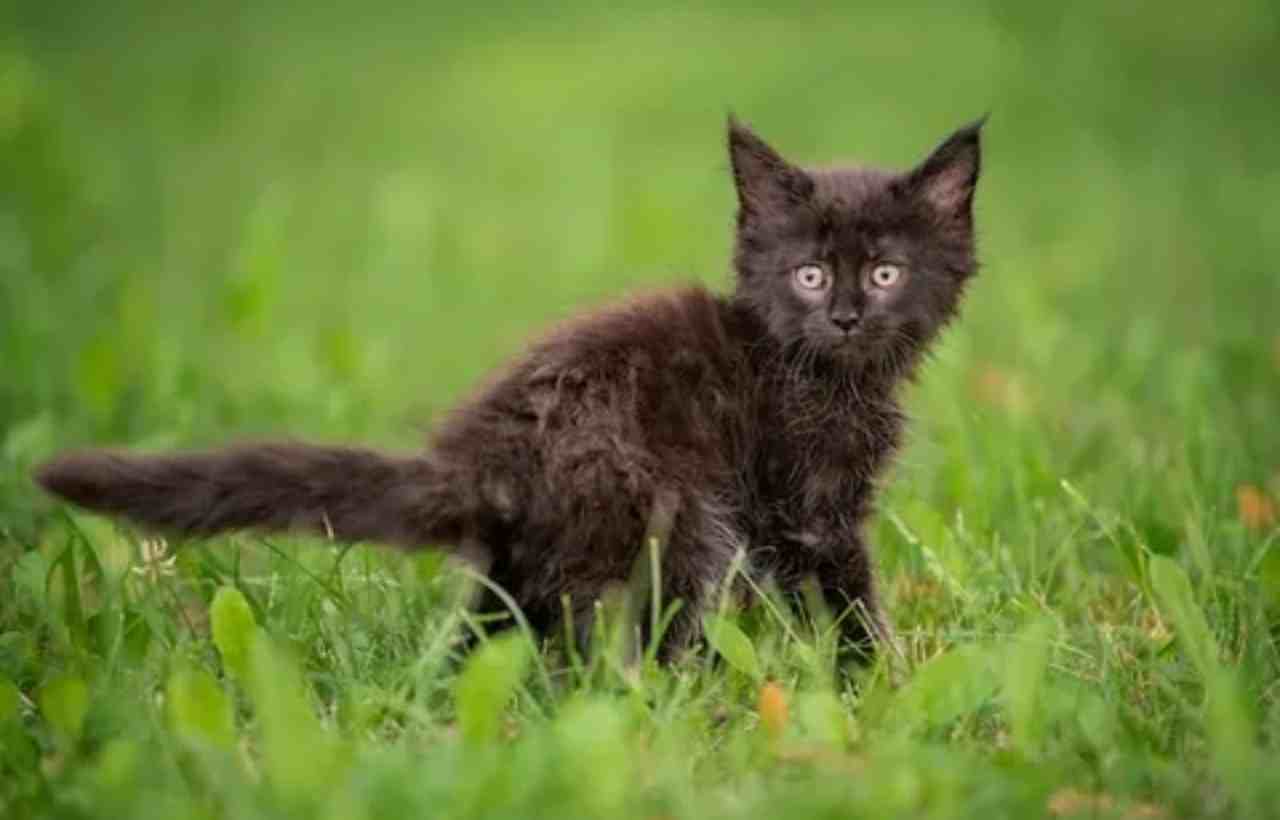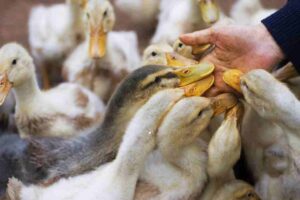If you’re looking for a feline companion that combines beauty, intelligence, and a playful personality, the black Maine Coon kitten is a captivating choice. Known for their majestic appearance and friendly nature, these kittens have become a favorite among cat enthusiasts worldwide. In this comprehensive guide, we will explore everything you need to know about black Maine Coon kittens, from their unique characteristics and care requirements to health considerations and training tips.
Maine Coon Breed

The Maine Coon is one of the oldest domesticated cat breeds in North America, known for its large size and tufted ears. Originating from the state of Maine, these cats have a rich history and are often referred to as “gentle giants.”
Characteristics of Maine Coon Kittens
Maine Coons, including the striking black variety, are renowned for several defining traits:
| Feature | Description |
|---|---|
| Size | Large; males generally weigh between 13-18 pounds, while females typically weigh 8-12 pounds. |
| Coat | Long, thick, and water-repellent fur; black Maine Coons have a rich, deep black coat. |
| Temperament | Friendly, sociable, and playful; known for their dog-like behavior. |
| Lifespan | Average lifespan is 12-15 years with proper care. |
With their charming personalities and stunning appearances, black Maine Coon kittens make ideal companions for families and individuals alike.
The Allure of Black Maine Coon Kittens

The black Maine Coon kitten is particularly enchanting due to its sleek and glossy coat. The striking appearance of these kittens captivates anyone who lays eyes on them.
Coat Color and Patterns
While Maine Coons are known for a variety of colors and patterns, the black variety is especially sought after. The black coat can vary in shade, and it may sometimes exhibit a slight brown tint in certain lighting conditions. The rich black color often enhances the kitten’s features, making their eyes appear even more vibrant.
| Color Variation | Description |
|---|---|
| Solid Black | Uniform black color throughout the coat. |
| Black Tabby | Black coat with distinct tabby markings. |
| Smoke Black | Dark black fur with lighter undercoat. |
Eye Color
Eye color in black Maine Coon kittens can range from vivid gold and copper to green and blue. The contrast between the eye color and the black fur creates a striking appearance that many find irresistible.
Personality Traits of Black Maine Coon Kittens

One of the most appealing aspects of black Maine Coon kittens is their friendly and sociable nature. These kittens are known for their playful and affectionate temperament, making them great companions.
Key Personality Traits
- Affectionate: Black Maine Coons often form strong bonds with their human companions. They enjoy cuddling and being close to their families.
- Playful: These kittens are highly playful and enjoy sultan chicken beautifully interactive play. They thrive on engaging activities that stimulate their minds and bodies.
- Intelligent: Maine Coons are known for their intelligence. They can be trained to perform tricks and respond to commands, making them interactive pets.
- Social: Black Maine Coons are generally social animals and get along well with other pets and children. Their friendly nature makes them ideal for multi-pet households.
Caring for Your Black Maine Coon Kitten
Caring for a black Maine Coon kitten requires a commitment to their health and well-being. Here are some essential aspects of kitten care:
Nutrition
Proper nutrition is critical for the growth and development of your black Maine Coon kitten. Here are some guidelines for feeding:
- High-Quality Kitten Food: Choose a high-quality kitten food that is rich in protein and essential nutrients to support healthy growth.
- Feeding Schedule: Kittens typically require more frequent feeding than adult cats. It’s advisable to feed them three to four small meals a day until they reach about six months of age.
- Hydration: Ensure your kitten has access to fresh, clean water at all times. Proper hydration is essential for their health.
Grooming
Maine Coons, including black kittens, have long fur that maine coon kittens in florida requires regular grooming to prevent matting and tangles. Here are some grooming tips:
| Grooming Activity | Description |
|---|---|
| Brushing | Brush your kitten at least two to three times a week to remove loose fur and prevent matting. |
| Bathing | While cats generally groom themselves, occasional baths may be necessary. Use a cat-specific shampoo and ensure thorough rinsing. |
| Nail Trimming | Regularly check and trim your kitten’s nails to prevent overgrowth and discomfort. |
Health Care
Regular veterinary care is essential for maintaining your black Maine Coon kitten’s health. Here are some health considerations:
- Vaccinations: Ensure that your kitten receives all necessary vaccinations according to your veterinarian’s recommendations.
- Parasite Control: Discuss flea, tick, and worm prevention with your veterinarian.
- Spaying/Neutering: Consider spaying or neutering your kitten when they reach the appropriate age to prevent unwanted litters and certain health issues.
Common Health Issues in Maine Coon Kittens
While Maine Coons are generally healthy, there are some breed-specific health issues to be aware of. Regular veterinary check-ups can help detect and manage these conditions early.
Hypertrophic Cardiomyopathy (HCM)
HCM is a common heart condition in Maine Coons, where the heart muscle thickens, potentially leading to heart failure. Regular veterinary check-ups and monitoring for symptoms such as lethargy or difficulty breathing are essential.
Hip Dysplasia
Maine Coons can be prone to hip dysplasia, a genetic condition where the hip joint does not fit properly into the hip socket. This can lead to arthritis and mobility issues as they age. Maintaining a healthy weight and providing proper exercise can help mitigate this risk.
Spinal Muscular Atrophy (SMA)
SMA is a genetic disorder that affects the spinal cord’s motor neurons, leading to muscle weakness and atrophy. While it is not life-threatening, it can affect mobility. Breeders should screen for this condition to reduce its occurrence.
Training Your Black Maine Coon Kitten
Training your black Maine Coon kitten can be a rewarding experience. Their intelligence and eagerness to please make them relatively easy to train. Here are some tips for effective training:
Basic Commands
- Sit: Start with simple commands like “sit.” Use treats to encourage your kitten to sit, rewarding them for following the command.
- Come: Use their name and a positive tone to call your kitten. Reward them with treats and praise when they come to you.
- Stay: This command can be useful for keeping your kitten safe. Start with short intervals and gradually increase the time before rewarding.
Litter Box Training
Maine Coon kittens are generally easy to litter box train. Here are some steps to ensure success:
- Choose the Right Litter Box: Select a litter box that is appropriately sized for your kitten. Ensure it has low sides for easy access.
- Use Unscented Litter: Kittens often prefer unscented litter. Fill the box with a few inches of litter and place it in a quiet, accessible location.
- Encourage Use: After meals or playtime, gently place your kitten in the litter box to encourage them to use it. Reward them with praise when they do.
Socialization Tips for Black Maine Coon Kittens
Socialization is crucial for your black Maine Coon kitten’s development. Early exposure to various environments, people, and other pets will help them become well-adjusted adults. Here are some tips:
Gradual Introductions
- New Environments: Allow your kitten to explore new rooms in your home gradually. Supervise them to ensure their safety.
- Meeting New People: Introduce your kitten to family and friends, allowing them to interact in a calm and positive manner.
- Other Pets: If you have other pets, introduce them slowly and monitor their interactions. Positive reinforcement can help foster a friendly relationship.
Positive Reinforcement
Use treats and praise to reward your kitten for positive interactions. This encourages good behavior and helps them associate new experiences with positive outcomes.
Finding Your Black Maine Coon Kitten
If you’ve decided to welcome a black Maine Coon kitten into your home, the next step is finding a reputable breeder or adoption center. Here are some tips for choosing the right place:
Choosing a Reputable Breeder
- Research: Look for breeders who are members of recognized cat associations such as The International Cat Association (TICA) or the Cat Fanciers’ Association (CFA).
- Visit the Facility: If possible, visit the breeder’s facility to assess the living conditions of the kittens and their parents.
- Ask Questions: Inquire about health screenings, vaccinations, and the socialization process of the kittens.
- Request References: Speak with previous customers to gauge their experiences with the breeder.
Adoption Options
Consider adopting from a local shelter or rescue organization. Many Maine Coons, including black kittens, are in need of loving homes. Here are some benefits of adopting:
| Benefit | Description |
|---|---|
| Saving a Life | By adopting, you’re providing a home to a cat in need. |
| Lower Cost | Adoption fees are typically lower than purchasing from a breeder and often include vaccinations and spaying/neutering. |
| Health Benefits | Shelters |
Final Thought:
The black Maine Coon kitten is a captivating and affectionate companion, known for its striking appearance and friendly nature. With proper care, including a balanced diet, regular grooming, and socialization, these kittens can thrive and become beloved members of your family. Whether you choose to adopt from a shelter or purchase from a reputable breeder, welcoming a black Maine Coon into your home promises a rewarding and joyful experience. Their playful personalities and gentle demeanor make them an ideal choice for families and individuals alike.
- Male Black Widow Spider Markings - March 23, 2025
- Mexican Red Headed Bird: A Brilliant Avian Wonder - January 16, 2025
- Can Turkeys Eat Bread? - January 15, 2025








